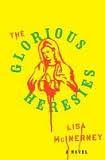 I had heard so many good things about this book (it won the 2016 Bailey’s Prize) that I was nervous it might not live up to expectations. It absolutely did.
I had heard so many good things about this book (it won the 2016 Bailey’s Prize) that I was nervous it might not live up to expectations. It absolutely did.
I was immediately drawn into the story of Ryan, a fifteen-year-old boy with an abusive, alcoholic father who is experiencing love (and as he tells us, manhood) for the first time.
He left the boy outside his own front door. Farewell to it, and good luck to it. From here on in it would be squared shoulders and jaws, and strong arms and best feet forward. He left the boy a pile of mangled, skinny limbs and stepped through the door a newborn man, stinging a little in the sights of the sprite guiding his metamorphosis. Karine D’Arcy was her name.
This book starts out sweet but it’s dark — only the characters are so well developed that you can’t help but want to be pulled down with them. Maureen is an older woman who accidentally murders a man. Georgie is a young woman who’s a drug addict and a prostitute. She can’t survive without selling her body, and she can’t sell her body without drugging herself. Ryan and his girlfriend are trying to stay true to each other in a world of drug, sex, organized crime, alcoholism, and violence. They’re teenagers, but in this world they aren’t, not for a minute.
This is one of those books where there is darkness and yet there is also love and sometimes hope. People do horrible things to each other, but most of the time they are actually doing those things for the love of someone else. Ryan’s father loves him but doesn’t know how to reach out to his son. Sadly, he doesn’t see himself as abusive and no one else reaches out to help. Maureen’s son tries to help her cover up a crime, setting off a chain of events with terrible impacts on the other characters in the novel. Georgie tries to find her missing boyfriend, even though he’s a guy who set her up in prostitution.
Maureen’s story goes back to the Magdalene Laundries, where girls were sent if they did anything the Catholic Church considered wrong, and were basically sentenced to years of servitude and abuse (there’s a great movie on these Laundries, The Magdalene Sisters). Maureen is lucky she didn’t get sent to the Laundries – she got sent to London and had her son taken away from her instead. She’s never gotten over what the Church and her parents did to her. And what we see in this book are some of the endless repercussions of the Church’s repression of women, sexuality, and reproduction.
“The Church craves power above all things, power above all of the living. The Church has an ideal and it’ll raze all in its way to achieve it. The Church needs its blind devout. Your mother, my mother, the people in there plumping Father Fiddler’s ego, they’re all for it. They’ve been given a class and they’re clutching it. The Church creates its sinners so it has something to save. Your mother’s a Magdalene for her Christ.”
I’m neither Catholic nor Irish, and I can’t say I’ve read a lot of Irish literature, so my perspective is limited here. McInerney’s depiction of Cork felt sometimes like reading about another world — although in some ways it’s your basic judgmental small town (Cork isn’t a small town but McInerney is writing about a small, under-side of Cork). In some ways this book felt almost Hardy-esque, where every event has consequences and everyone knows everyone else.
I had to work a bit to understand all the dialect, but I never mind that about a book. In fact I like that feeling of learning new words and knowing I’m reading about a different place.
There’s so much to love about this book. I keep thinking in contradictions: the writing is so beautiful and so ugly at the same time. It’s funny and tragic, and you will love and hate the characters. That may sound trite but it’s the best I can do. The ending is wonderful and I tend to be disappointed in endings. I’m not sure how McInerney pulled it all off, but I’m glad she won the Bailey’s Prize.
I received an advance review copy of this book from NetGalley and publisher Random House LLC. The book published August 9, 2016.

